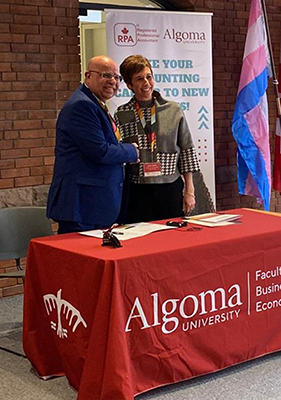Bridging Education and Industry: Reflections from the Algoma University and RPA Canada memorandum of understanding

The partnership, which launches a new training program for aspiring accountants, is a forward-thinking strategy that will enrich the Canadian accounting profession
 |
RPA Canada CEO Zubair Choudhry and Algoma University president and vice-chancellor Asima Vezina celebrate the signing of the MOU. |
SAULT STE. MARIE – In the dynamic landscape of Canadian accounting education, a significant milestone has been achieved through a partnership between Algoma University and the Society of Professional Accountants of Canada (RPA Canada). This collaboration is a pivotal development for both institutions, marked by the signing of a Memorandum of Understanding (MOU) that launches a new training program for Algoma students. One integrating academic learning with real-world accounting experience, leading to the Registered Professional Accountant (RPA) designation.
The RPA designation targets accounting for small to medium-sized enterprises. Through this partnership, Algoma will provide the prerequisite courses required as part of the designation process.
Perspectives from the signatories offer insight into the basis for partnership and how it is expected to benefit students and the small to medium-sized enterprises they stand to serve.
Associate Professor Jo-Anne Ryan, Chair of the Algoma University Accounting Department, emphasized the transformative nature of the initiative: “With RPA, we are offering Algoma students a choice, which is about providing them more opportunity and helping them make decisions about their post-graduation career paths, whether they work at large corporations or small to medium-sized enterprises. Historically, they had only one option, but now there’s another designation available for them.
"RPAs specifically focus on Small to Medium-Sized Enterprises and not-for-profit accounting, which is a massive area in Canada where there is a shortage of accountants with these necessary skills. We are a small program, and students are enthusiastic about it; they want to be leaders and this designation gives them that option, specifically in areas like Brampton, which is significant for us. Entrepreneurs in Brampton and Sault Ste. Marie will need to make choices based on what is best for them.”
Vice Chancellor Asima Vezina, President of Algoma University, also highlighted the mutual benefits of the agreement: “This presents an opportunity for both organizations, which is the beauty of such partnerships. It benefits both groups; for RPA, it brings some of our talented graduates and students to start developing their expertise in the field, and for Algoma, it represents the best partnership we could have.
"For me, that means opportunity for our faculty and students; it will raise their profile as university graduates and provide them opportunities post-graduation here at Algoma. It sets them up with a partner that can continue to nurture their education and ongoing development.”
Professor William Wei, Dean of Faculty at Algoma University, stressed the importance of the initiative in addressing specific market needs: "With the RPA designation, the more you nurture business talent in the community, the more opportunities you provide for university graduates, whether in the small business sector, banking, finance, mid-size business, or even large corporations. Having a continuous talent pool of graduates coming into your organization, graduating from your local community, keeps a wealth of talent right here in Brampton, Sault Ste. Marie, or in other cities across Canada.”
In closing remarks, Zubair Choudhry, President and CEO of RPA Canada, summarized the RPA perspective: "There is a significant gap in the accounting profession. Knowing that 98 percent of businesses in Canada, and any other jurisdiction, consist of Small to Medium-Sized Enterprises (SMEs), the accounting profession benefits from a designation focused on serving SMEs. Professional accountants must be educated and trained with the most relevant knowledge and equipped with skills around emerging technologies. I believe it is important to provide an alternative to students pursuing a career in accounting. One that is affordable, relevant, and accessible."
These views centre around the idea that there is a mutual benefit to students and industry in targeting a critical area of the market that may be challenged finding competent and affordable professional accounting services. The partnership is viewed as a forward-thinking strategy designed to enrich the accounting profession by improving the skill set of a wider array of accounting students and increasing the accessibility of high quality accounting services to SMEs in the process.
This partner post was sponsored by the Society of Professional Accountants of Canada (SPAC).










(0) Comments